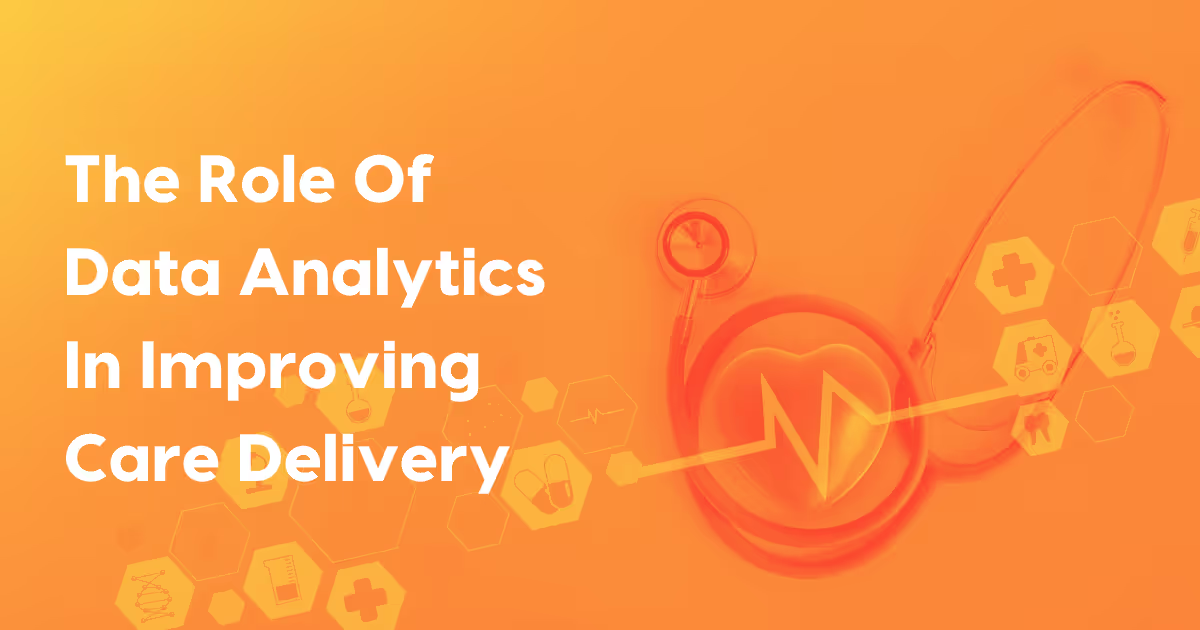The Role of Data Analytics In Improving Care Delivery And Reducing Costs Using EHRs

Electronic health records (EHRs) are a vital tool in the healthcare industry, providing a digital record of a patient's medical history that can be accessed by authorized healthcare providers. In addition to improving the accuracy and efficiency of care delivery, EHRs also generate a large amount of data that can be analyzed to identify trends, improve care delivery, and reduce costs.
Data analytics refers to the process of examining and interpreting data to uncover insights and inform decision-making. In the context of EHRs, data analytics can be used to identify patterns and trends in patient data that can help to improve care delivery. For example, data analytics can be used to identify high-risk patients who may benefit from more frequent monitoring or to identify areas where care can be improved or made more efficient.
Apart from the shared example, there are a number of other ways data analytics can be useful in improving care delivery and in reducing operational costs. In this article we are listing some of such improvement opportunities with data analytics.
Identifying Opportunities For Disease Prevention And Management
By analyzing patient data, healthcare providers can identify risk factors for certain diseases and take proactive steps to prevent or manage these conditions. For example, data analytics can be used to identify patterns of behavior or environmental factors that may increase the risk of developing certain conditions, such as diabetes or heart disease. By identifying and addressing these risk factors, healthcare providers can help to reduce the incidence of these conditions and improve patient outcomes.
Improving Care Delivery Through The Use Of Predictive Analytics
Predictive analytics involves using data and statistical algorithms to identify the likelihood of future outcomes based on historical data. In healthcare, predictive analytics can be used to identify patients at risk for certain conditions or complications and to intervene early to prevent or mitigate these risks. For example, predictive analytics can be used to identify patients with diabetes who are at risk for developing foot ulcers, a common complication of diabetes that can lead to amputation if not properly treated. By identifying these patients early, healthcare providers can take steps to prevent the development of foot ulcers, improving patient outcomes and potentially reducing costs.
Identifying Areas Where Costs Can Be Reduced Or Eliminated
Data analytics can be used to reduce costs in healthcare by identifying areas where costs can be reduced or eliminated. For example, data analytics can be used to identify unnecessary or duplicate tests and procedures, or to identify opportunities for streamlining processes. One study found that using data analytics to identify and eliminate unnecessary tests and procedures in a large healthcare system resulted in a cost savings of over $100million per year. By analyzing patient data, healthcare providers can identify tests or procedures that may not be necessary or that may have already been performed, and take steps to eliminate or consolidate these procedures. This can help to reduce the overall cost of care for patients and for the healthcare system as a whole.
Improve Patient Engagement And Satisfaction
By analyzing patient data, healthcare providers can tailor their care to the individual needs and preferences of their patients. For example, data analytics can be used to identify patient preferences for communication and to deliver care in a way that is most convenient and appealing to the patient. This can help to improve patient adherence to treatment plans and can lead to better patient outcomes.
Challenges
One of the main challenges in using data analytics to improve care delivery and reduce costs is the need to ensure that the data is accurate and up-to-date. EHRs can be complex systems, and it is important to ensure that data is entered correctly and consistently to ensure the accuracy of the analysis.
Another challenge is ensuring that data analytics is used in a way that is consistent with patient privacy and confidentiality. EHRs contain sensitive personal and medical information, and it is important to ensure that this information is protected and used only for authorized purposes. This includes measures such as secure authentication, encryption, and access controls. Healthcare organizations must have robust privacy and security policies in place to ensure that data analytics is used in a way that is compliant with relevant laws and regulations.
Additionally, data analytics requires specialized expertise and tools, and healthcare organizations may need to invest in training and resources to effectively use data analytics. For the last 10 plus years, Fission Labs has been helping organizations with these necessary expertise through our data analytics services.
Conclusion
Despite the challenges, the use of data analytics in conjunction with EHRs has the potential to significantly improve care delivery and reduce costs in the healthcare industry. By identifying trends and patterns in patient data, healthcare organizations can target their efforts to improve care and make the most effective use of resources. In addition, the use of data analytics can help to improve patient engagement and satisfaction, leading to better patient outcomes and a more positive healthcare experience overall.
At Fission Labs, we have diversified teams with years of experience in delivering digital transformation to the healthcare, pharma and life science sector including data analytics solutions and services. We offer a wide range of services that can help you get the most out of your data. We have a team of experienced engineers who are experts in data engineering and big data management.
We can help you with all sorts of things, such as data acquisition, data cleansing & loading, in creating data warehouses & data marts, and in developing reports & dashboards. Plus ,we can also help you in implement big data solutions such as Databricks, Cloudera, Snowflake, Hadoop, and Spark at your organization.
So if you're looking for help with building and/or implementing data analytics solution at your organization, get in touch with us. We would be more than happy to discuss your needs and see how we can help.
Content Credit: Mohit Singh



